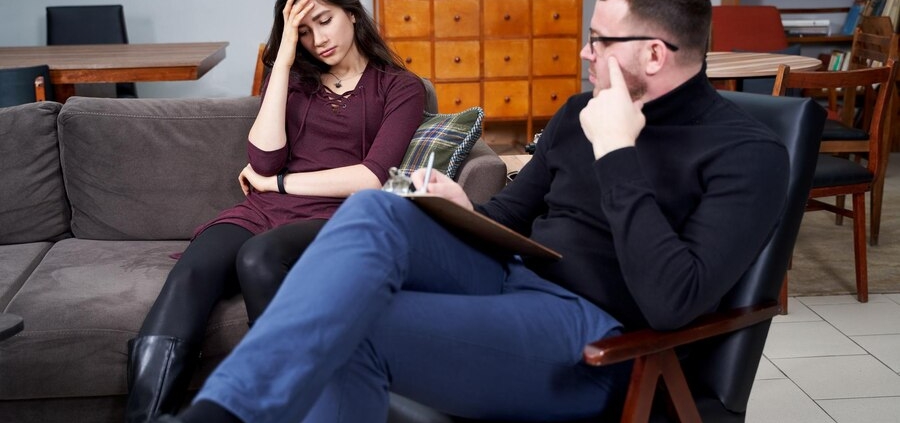Addiction recovery is a difficult and intensely personal process, made much more complicated by the presence of a spouse. For couples struggling with drug misuse, choosing the correct treatment program is critical not just for breaking the cycle of addiction, but also for rebuilding and strengthening their relationship. Outpatient therapy programs for couples provide a versatile and successful approach that addresses both the individual and relationship components of recovery. Unlike inpatient programs, which require participants to stay at the facility for an extended length of time, outpatient programs allow couples to continue their regular routines and obligations while getting the necessary support and care.
In this post, we’ll look at the complexities of outpatient therapy programs developed exclusively for couples. We will begin by defining outpatient therapy, followed by an analysis of the specific demands that couples encounter during rehabilitation. Furthermore, we will look at the key components that make outpatient programs for couples effective, such as individual and joint therapy sessions, skill-building workshops, and aftercare services. Understanding these components allows couples to make educated decisions about their treatment options and begin on a recovery journey together.
Services for Couples
I. Understanding Outpatient Treatment Programs
Outpatient treatment programs have become an important part of the addiction recovery landscape, providing a flexible and accessible alternative for people in need. These programs are designed to provide comprehensive therapy without requiring a residential stay, making them an appealing option for many individuals and couples who must balance treatment with everyday commitments.
Definition and Purpose
Outpatient treatment programs are structured systems of care that allow patients to remain at home while getting treatment for drug use disorders or other behavioral health concerns. The major goal of these programs is to provide people the tools and support they need to manage their recovery in the context of their daily life. Unlike inpatient programs, which require patients to stay in a treatment center for a lengthy period of time, outpatient programs include therapy sessions, educational courses, and support groups at regular intervals throughout the week.
Types of Outpatient Programs
Several types of outpatient treatment programs exist, each tailored to meet varying levels of need and intensity:
- Standard Outpatient Programs (OPs): These programs typically involve one or two therapy sessions per week and are best suited for individuals with mild addiction issues or those stepping down from more intensive care.
- Intensive Outpatient Programs (IOPs): IOPs offer a more rigorous schedule, often requiring multiple sessions per week, including individual therapy, group therapy, and educational workshops. They are designed for individuals who need a higher level of support but still wish to maintain their daily routines.
- Partial Hospitalization Programs (PHPs): PHPs, also known as day programs, provide the highest level of outpatient care. Patients attend sessions for several hours each day, often five to seven days a week, receiving intensive treatment that includes medical monitoring, therapy, and skill-building activities.
Benefits of Outpatient Care
Outpatient treatment programs offer a range of benefits that make them an attractive option for many individuals and couples:
- Flexibility: Patients can continue to manage their personal, professional, and familial responsibilities while receiving treatment. This flexibility is particularly beneficial for couples who might have children or work commitments.
- Cost-Effectiveness: Generally, outpatient programs are less expensive than inpatient programs, making them more accessible to a broader range of people.
- Real-World Application: Outpatient care allows individuals to apply the skills and strategies they learn in treatment to their everyday lives immediately. This real-time application can reinforce learning and aid in long-term recovery.
- Community Support: Patients remain integrated within their communities, which can provide additional support networks that are crucial for sustained recovery.
Understanding these aspects of outpatient treatment programs lays the foundation for exploring how these programs can be specifically tailored to meet the unique needs of couples in rehab, ensuring both partners receive the support they need on their journey to recovery.
II. The Unique Needs of Couples in Rehab
When it comes to drug misuse treatment, couples confront unique problems and possibilities that differ from those faced by individuals. Understanding these specific requirements is critical for creating effective outpatient treatment programs that provide significant and long-term assistance. We will look at some crucial elements that distinguish couples’ recovery as a specialist subject.
Communication Challenges
Effective communication is the foundation of every successful relationship, but it is particularly important in the context of rehabilitation. Couples dealing with substance misuse frequently encounter communication difficulties, which can worsen misunderstandings and disputes. These communication difficulties can be caused by a multitude of factors, including emotional instability, distrust, and the impact of drugs on behavior and perception.
Therapists in an outpatient environment help couples rebuild open and honest lines of communication. Active listening, nonverbal communication signals, and conflict resolution procedures are all often used techniques. Outpatient programs can help couples build a more resilient relationship by creating a supportive atmosphere in which each partner feels heard and understood.
Emotional Support Dynamics
Emotional support is another key component that demands special consideration in couples’ rehabilitation. Unlike solo treatment, which focuses primarily on one person’s emotional well-being, couples’ rehabilitation must address both spouses’ interwoven emotional landscapes. This dual emphasis involves a balanced strategy that acknowledges each person’s emotional needs while encouraging mutual support.
Therapists in outpatient programs frequently utilize approaches like emotionally focussed therapy (EFT) to assist couples traverse their emotional landscapes. EFT enables couples to understand and express their feelings, which fosters a stronger emotional connection. Couples may foster a healing atmosphere by learning how to provide and receive emotional support.
Shared Triggers and Relapse Prevention
One of the most significant challenges for couples in rehab is the presence of shared triggers that can lead to relapse. These triggers can range from mutual friends who use substances to specific environments or stressors that both partners find challenging. In such cases, the risk of co-relapse is heightened, making effective relapse prevention strategies essential.
Outpatient programs for couples often include sessions focused specifically on identifying and managing shared triggers. Couples are guided through the process of recognizing situations that may jeopardize their sobriety and developing joint strategies to avoid or cope with these triggers. Techniques may include creating a shared action plan, establishing new routines, and setting mutual goals for sobriety.
By addressing these unique needs—communication challenges, emotional support dynamics, and shared triggers—outpatient treatment programs can offer couples a tailored approach to recovery. This specialized focus not only aids in overcoming substance abuse but also strengthens the relationship, laying a solid foundation for a healthier, more connected future.

III. Components of Effective Outpatient Programs for Couples
Effective outpatient treatment programs for couples are designed to address both individual and shared issues that partners confront as they navigate the recovery journey together. These programs aim to promote mutual support, improve communication, and increase resistance to relapse. The following are the important factors that contribute to the effectiveness of these outpatient programs:
Individual and Joint Therapy Sessions
Individual and collaborative treatment sessions are a key component of outpatient programs for couples. Individual therapy allows each partner to address their particular concerns, such as emotional trauma, mental health illnesses, or drug abuse, in a private setting. This one-on-one time with a therapist is essential for self-discovery and personal development, which enhances the partnership.
Joint treatment, on the other hand, focuses on the couple as a whole. These sessions are intended to increase communication, settle issues, and reestablish trust. Therapists assist couples in developing healthy coping processes and methods to support one other’s recovery. Couples who confront challenges jointly can build a stronger, more durable relationship.
Skill-Building Workshops
Workshops to improve skills are another important component of effective outpatient programs for couples. These programs address a variety of issues, including communication skills, stress management, and conflict resolution. Learning these skills is critical for couples to handle the intricacies of recovery while maintaining a good relationship.
Workshops frequently involve participatory activities and role-playing exercises, allowing couples to practice new skills in a safe atmosphere. These seminars are intended to be exciting and practical, giving couples the tools they need to deal with real-life scenarios. The strategies gained in these sessions can help couples manage stressors, avoid relapse, and support one another in sustaining long-term sobriety.
Aftercare and Support Networks
Recovery is an ongoing process that extends beyond the initial treatment phase. Effective outpatient programs for couples recognize the importance of aftercare and support networks in maintaining sobriety and relationship health. Aftercare services may include continued therapy sessions, support groups, and access to resources that can help couples stay on track.
Support networks play a crucial role in the recovery journey. Couples are encouraged to build a network of supportive friends, family members, and peers who understand their challenges and can offer encouragement and accountability. Many outpatient programs also provide access to alumni groups, where couples can connect with others who have successfully navigated similar experiences.
In summary, effective outpatient treatment programs for couples incorporate individual and joint therapy sessions, skill-building workshops, and robust aftercare and support networks. These components work together to address the unique needs of couples in recovery, fostering mutual support, enhancing communication, and building resilience against relapse. By participating in these comprehensive programs, couples can strengthen their relationship and achieve lasting sobriety.
IV. Find Outpatient Treatment Programs for Couples Near You
Outpatient treatment programs for couples provide a unique and effective approach for those seeking recovery while maintaining their daily responsibilities. These programs are designed to address the distinct challenges that couples face, such as communication barriers, emotional support needs, and shared triggers for relapse. By offering a combination of individual and joint therapy sessions, skill-building workshops, and robust aftercare support networks, outpatient programs empower couples to work together towards sustained sobriety and healthier relationships.
The flexibility inherent in outpatient care allows couples to apply the strategies and skills they learn in real-time, fostering an environment for practical, immediate growth and improvement. By focusing on both the individual and the relationship, these programs help couples build a solid foundation for long-term recovery and mutual support.
Finally, the effectiveness of outpatient treatment programs for couples stems from their complete approach, which addresses the varied nature of addiction and marital dynamics. Couples may walk their recovery path together by receiving expert direction, individualized treatment, and ongoing support. They will emerge stronger and more resilient. If you’re thinking about getting outpatient therapy for yourself or a loved one, contact us now to see how we can help.

FAQs
- What is an outpatient treatment program for couples, and how can it help?
Answer: These programs offer therapy and support for couples struggling with addiction, codependency, or relationship issues while allowing them to maintain their daily routines.
- What are some of the advantages of choosing an outpatient treatment program for couples?
Answer: Outpatient programs offer flexibility. Couples can continue working and fulfilling family obligations while attending therapy sessions at Couples Rehab.
- How do outpatient treatment programs for couples address both addiction and relationship issues?
Answer: Couples Rehab therapists understand the complexities of addiction and its impact on relationships. Programs address both aspects individually and jointly, promoting individual healing and strengthening communication for a healthier partnership.
- Can couples outpatient treatment programs benefit couples even if only one partner struggles with addiction?
Answer: Absolutely! Codependency and unhealthy relationship dynamics can be just as detrimental. Couples Rehab programs help both partners understand their roles and develop healthier ways to support each other.
- What happens if my partner is hesitant about outpatient treatment for couples?
Answer: Couples Rehab offers resources and information to help convince a hesitant partner. Highlight the benefits of working together for a stronger relationship and overcoming challenges.
- How much of a time commitment is required for outpatient treatment programs for couples?
Answer: Time commitment varies depending on your needs and the program structure. Couples Rehab offers flexible scheduling to accommodate your life.
- Can couples with children participate in outpatient treatment programs?
Answer: Yes! Couples Rehab offers programs designed for couples with children. We can also provide guidance on managing childcare while attending therapy sessions.
- Does insurance cover outpatient treatment programs for couples offered by Couples Rehab?
Answer: Many insurance plans cover outpatient treatment. Couples Rehab can verify your benefits and work with your provider to maximize coverage.
- How can outpatient treatment for couples strengthen my relationship beyond addressing addiction?
Answer: Couples Rehab goes beyond addiction recovery. Therapy fosters better communication, conflict resolution skills, and healthier dynamics, leading to a stronger and more fulfilling relationship.
- What happens after completing outpatient treatment for couples at Couples Rehab?
Answer: Couples Rehab offers long-term support! We can provide resources and strategies to maintain healthy communication and prevent relapse, ensuring lasting positive changes.











